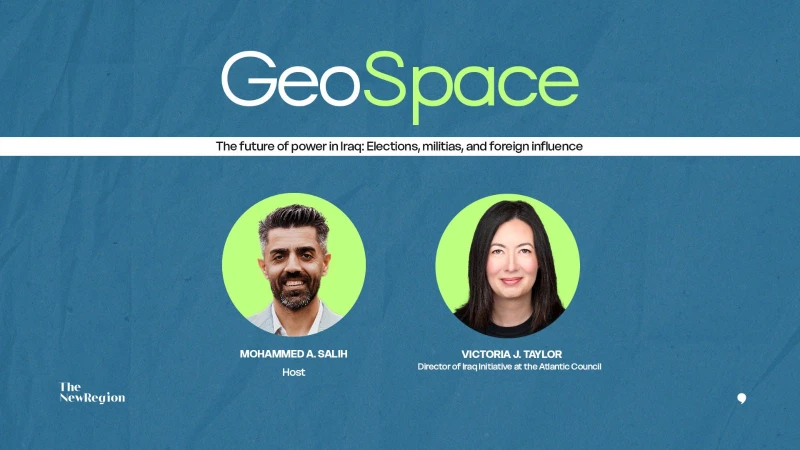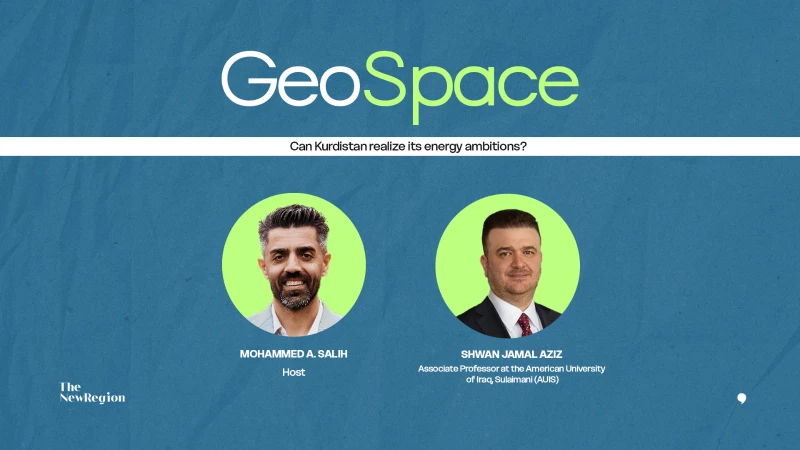In the third episode of The New Region’s GeoSpace series, host Mohammed Salih asked Turkey expert and Professor Emeritus at Lehigh University in the US Henri Barkey a series of hard-pressing questions about recent developments in the Turkish political landscape.
Barkey tackled the recent efforts toward peace between Abdullah Ocalan’s Kurdistan Workers’ Party (PKK) and the Turkish state, as well as President Recep Tayyip Erdogan’s political standing, his authoritarian-leaning recent policies, and his positioning in the next presidential elections.
“Erdogan for the first time is facing the potential of losing an election,” according to Barkey, who hypothesized that this anxiety has prompted the Turkish president to jail Ekrem Imamoglu, the former Istanbul mayor, on “made-up charges.”
The Turkey expert noted that by jailing his leading opponent for presidency, Erdogan “has undermined his own future, his legacy,” predicting that “there is no way he can win an election again, even if Imamoglu is in jail.”
Erdogan was poised to face Ekrem Imamoglu in the next presidential elections set to be held in 2028; the deposed Istanbul mayor was the People’s Republican Party (CHP) candidate and Erdogan’s main opponent in the running.
“He [Erdogan] now has three opposition politicians in jail,” the professor emeritus noted, adding that “Today Turkey has essentially become an authoritarian country… and elections are designed… to make sure that the incumbent is re-elected.”
Erdogan has led Turkey "into a situation that is actually worse than what he took over” in the early 2000s, according to Barkey.
Speaking on the peace talks between the PKK and Turkey, Barkey noted that “the PKK clearly has decided that the time has come to disarm.” He said that Kurds in Turkey are “amazingly loyal” to Ocalan, who also seems to think that it is time for the PKK to disarm. The Kurds will listen to what he will say, he believes.
Barkey emphasized that the peace talks are also “a legacy issue for Ocalan,” who realizes that going forward, armed struggle is not as effective as the pro-Kurdish People’s Equality and Democracy (DEM) Party’s contributions to the Kurdish cause. The Turkey expert added that a potential deal “also lifts the burden on Turkish Kurds of having always been accused of terrorism.”
He added that once a deal is reached, the Turkish constitution will not change “the day after tomorrow, but it will change once there is a deal and some time goes by and this issue of terrorism has to disappear in people’s consciousness.”
Salih and Barkey then moved on to Turkey’s foreign policy, discussing the overthrow of Bashar al-Assad in Syria and the rise to power of Ahmed al-Sharaa, the current president of Syria, which Barkey described as “a victory for Turkey.”
Sharaa’s Hayat Tahrir al-Sham, who led the offensive that toppled Assad, are now “very grateful” to Turkey because of the help they received from Syria’s neighbor to the north previously.
Going further south, however, tensions between Turkey and Israel, particularly under Erdogan, have risen due to Turkey’s “support” for Hamas and Hezbollah, who have been a long-standing threat to Israeli security. A change in power in Turkey would alleviate some of those tensions with Erdogan gone, Barkey added.
The professor stressed that the "most important threat" to Turkey is the US, illustrating his point through Turkey’s outlook toward their relations with the US. Barkey said that Turkey has “never attacked” Washington and “now when he talks about [US President Donald] Trump, he says ‘my friend.’”


 Facebook
Facebook
 LinkedIn
LinkedIn
 Telegram
Telegram
 X
X


